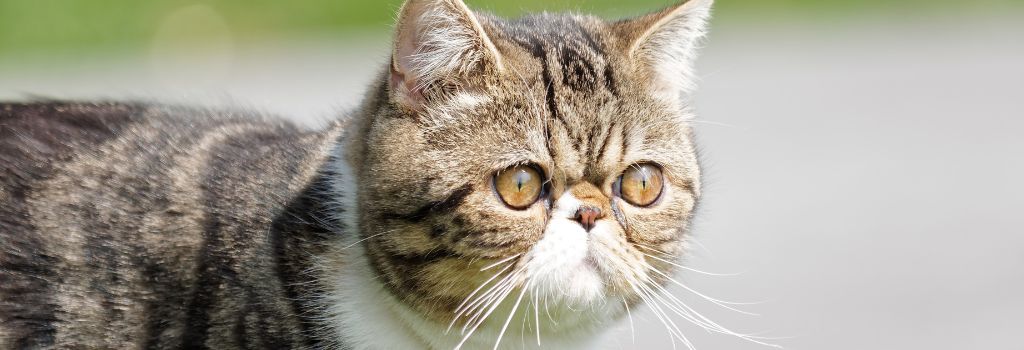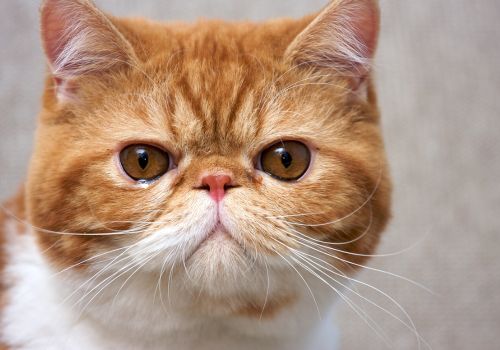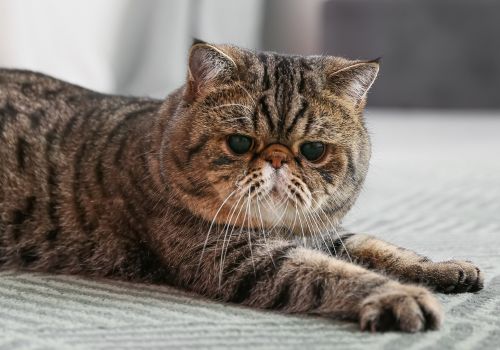If you're lucky enough to share your home with one of these adorable furballs, you know they're something special. These cats are like little empathic beings; they seem to just get you—picking up on your mood, curious about your day, and yes, purring their way into your heart's deepest corners.
So Much To Love
A quiet, melodious meow that won't disturb your Zoom meetings, a lively and cheerful personality, and the ability to get along with kids and other pets. Let's not forget the best part: they're like little lovebugs, loyal and ever so affectionate!
Too Much Love?
Your Exotic Shorthair is people-oriented to the max, meaning they’d rather not be left alone for long. They might not demand too much attention, but they certainly love it! Their luxurious coat, while easier to manage than a Persian's, still calls for regular grooming sessions. And be aware, these beauties are susceptible to a few health issues and can get quite anxious when you're not around.
So is it all worth it? A resounding yes! What you get in return is an incredibly playful and loving family companion, full of endearing quirks and unique characteristics that you won't be able to resist.
Back Into Time
The Exotic Shorthair is like the "designer breed" of the cat world. Breeders aimed for a low-maintenance Persian and hit the jackpot by crossing Persians with British Shorthairs and other shorthaired breeds. Voila, the Exotic Shorthair was born! Officially recognized as its own breed in 1967, this feline marvel combines the best of both worlds: the easy-going, affectionate nature of a Persian and the playful, energetic vibe of its shorthaired relatives.

Whether you've got kids, other pets, or just want a loving and low-key companion, the Exotic Shorthair ticks all the boxes. And, let's be honest, we could all use a little more purring and a lot more love in our lives, right?
Genetic Predispositions for Exotic Shorthairs
The Mystery of Cat Cardiomyopathy
In our feline friends, the medical term for heart disease is cardiomyopathy. It can either be a genetic condition or a side effect of other diseases messing with the heart. The most common variant is called Hypertrophic Cardiomyopathy (HCM), which basically means a thickening of the heart muscle. An overactive thyroid gland is often the culprit here. Dilated Cardiomyopathy (DCM) is another variant, which used to be linked to a lack of taurine in your cat’s diet. Thankfully, this is less common today, as cat food companies are now adding taurine. But here's the tricky part: cats are pros at hiding when they're not feeling well. If you notice your fur baby breathing rapidly, acting lethargic, or losing appetite, it's crucial to consult your vet ASAP. These could be signs of cardiomyopathy that's been festering for a while. Get your pet evaluated twice a year; early detection is key.
FATE: Feline Aortic Thromboembolism
For cats with heart disease, there's the risk of developing blood clots known as FATE. These nasty little things can block the main highway of blood from the heart to the hind legs. Imagine your cat suddenly dragging their legs or crying out in pain—this is an emergency, folks! But don't lose hope; cats who survive these scary episodes usually make a full recovery. Medications can also help in preventing these clots if your cat has been diagnosed with heart disease.
When Breathing Becomes a Challenge: Brachycephalic Syndrome
Now, let's talk about Brachycephalic Syndrome, especially relevant if you have an Exotic Shorthair. Picture all the respiratory tissues crammed into a tiny, flat face. What you get are cats that can barely breathe! Sleep apnea, chronic respiratory infections, and even heat stroke are more common in these cuties. If you want your cat to live a long, comfortable life, consider corrective surgery. This can often be performed when your cat is spayed or neutered. Surgery usually fixes the issue, helping them breathe easier and live longer.
A Cloudy Outlook: Dealing with Cataracts
Cataracts can be a dark cloud—literally—on your older Exotic Shorthair's life. They make the eyes look more like frosted glass than clear windows. While surgery can sometimes restore sight, many cats adapt well to gradually losing their vision. Keep an eye out (no pun intended!) for this during your cat’s biannual exams.
Missing Eyelids? That's Eyelid Agenesis
The oddly specific Eyelid Agenesis. It's a birth defect where the upper eyelid just doesn't form right. Imagine how it feels to have dust and debris always hitting your eye. Yeah, not fun. Over time, this irritation could lead to corneal ulcers and scarring, compromising vision. The good news is that surgical eyelid reconstruction usually solves the problem, giving your feline friend a chance at a life of clear sight.

Feline Lower Urinary Tract Disease (FLUTD)
Feline Lower Urinary Tract Disease (FLUTD) is an umbrella term covering a range of urinary issues, from bladder stones to infections. If you notice signs like urinating on cool surfaces, blood in the urine, or straining while urinating, give your vet a call ASAP. This is especially critical for male cats, as blocked urethras can become fatal within hours. Early detection through regular urinalysis can be a lifesaver, and treatment often involves medication or dietary changes.
The Hidden Toll of Polycystic Kidney Disease in Cats
Is your Persian or Exotic Shorthair acting strange around the age of seven? Pyruvate Kinase Deficiency (PKD) could be to blame. It's a genetic condition where cysts form in the kidneys and, potentially the liver. Watch out for weight loss, vomiting, and excessive thirst. Early detection through routine urine or blood tests can help manage the disease. Unfortunately, there's no cure, but medication and special diets can make life easier for your feline friend.
Hip Dysplasia: Not Just a Dog Problem
Did you know that hip dysplasia isn't exclusive to dogs? It can happen to cats too, especially Exotic Shorthairs. Your cat might seem perfectly fine in its kitten years but could begin acting older prematurely. Early detection via pelvic X-rays is essential. So, next time you're at the vet for your kitten's spay or neuter, consider asking for an X-ray. Treatment often involves surgical intervention and early action makes a big difference.
The Hidden Dangers of Portosystemic Shunt
This rare but severe condition involves abnormal blood flow around the liver. It leads to a poorly nourished liver and a buildup of waste in the bloodstream. Symptoms can include neurological issues and extreme sensitivity to drugs and anesthesia. Diagnosis involves blood tests or liver ultrasounds, and surgery may be needed to restore proper blood flow.
FIP: The Silent Killer
Feline Infectious Peritonitis (FIP) is a deadly disease more commonly seen in Exotic Shorthairs. It's tricky to screen for and, unfortunately, there's no cure. When getting a new kitten, inquire about any history of FIP in the family or cattery.

FeLV: A Lurking Threat
Feline Leukemia Virus (FeLV) can be a silent killer, causing everything from anemia to cancer. Annual vaccines can offer some protection, but regular testing is advised, especially before breeding.
The Importance of Knowing Your Cat's Blood Type
If an emergency strikes, knowing your cat's blood type can be a life-saver. This is particularly important for purebred cats, who may have uncommon blood types. A quick test during a routine vet visit can make all the difference.
Neonatal Isoerythrolysis: A Breeder's Caution
Planning to breed your Exotic Shorthair? Be wary of Neonatal Isoerythrolysis (NI), a rare condition causing a fatal reaction in kittens with mismatched blood types. Consult your vet for guidance if you plan to breed.
When Separation Anxiety Hits Your Feline Friend
If your Exotic Shorthair becomes destructively bored when you're away, it might be suffering from separation anxiety. Stable routines and mind-engaging toys can help, and in extreme cases, medications may be prescribed.
Dystocia: A Breeding Challenge for Exotic Shorthairs
For would-be breeders, remember that Exotic Shorthairs face a higher risk of dystocia, or difficulty giving birth. It's a commitment that requires expertise and could be costly, so tread carefully.
Don't have a vet in your area yet? We can help you find a local veterinarian.
If you have more questions, the GeniusVets Telehealth platform will give you unlimited access to text and/or video calls with board-certified veterinarians! To learn more click here.
